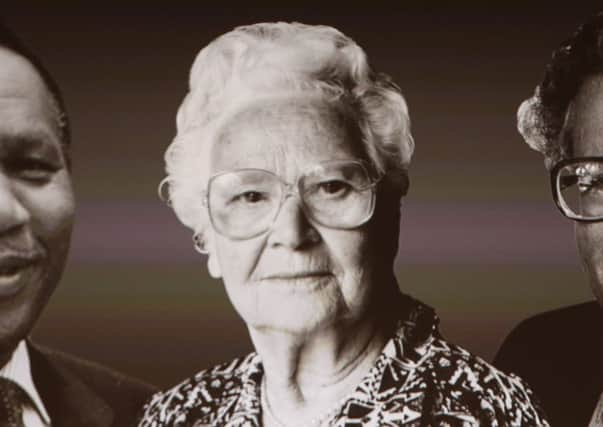Obituary: Dame Mary Glen-Haig, fencer


Dame Mary Glen-Haig was a pioneer in women’s sport, representing Great Britain as a fencer in four Olympic Games between 1948 and 1960, and winning gold at the British Empire Games in 1950 and 1954. She later carved out a distinguished career as a tough administrator, becoming one of the International Olympic Committee’s (IOC) first female members, and one of Britain’s two representatives, serving on the committee for 12 years from 1982.
Born in Islington, north London, in 1918, Mary Alison James was the daughter of Captain William James and his wife, Mary. She was educated at Dame Alice Owen’s School. Her interest in fencing was sparked by her father, a former fencer and Olympian of the 1908 London Games.
Advertisement
Hide AdAdvertisement
Hide AdIn the early 1930s, Regent St Polytechnic asked him to set up a fencing school, which Mary joined, and by the time she was 14 was a member of the inaugural women’s team.
Mary, encouraged by her father, would train all the time and everywhere. She recalled her father “even turned our billiard room into somewhere I could practise, which was not welcomed by the rest of the family, I can assure you.”
She began taking part in regional and international fencing competitions in 1937 and was picked for the 1948 Olympic Games in London, following her first major victory at the Women’s National Foil Championship.
She had married Andrew Glen Haig in 1943 but after the war they agreed to separate although.
Dubbed the “austerity” games, owing to the fact that the entire budget was a mere £75,000, London had been given the honour of staging the first major post-war sporting event. There was no Olympic village, no frills and Glen-Haig’s work colleagues “hadn’t seemed too bothered about how well she did… as there had been a ghastly war… and we didn’t worry about things like winning medals”.
Competitors from 53 countries arrived and were housed in schools, barracks, run-down buildings and lodgings. Glen-Haig shared a room with two other girls in a dilapidated house behind Victoria Station and with food rationing still in force many teams had to bring their own food.
At the time, she was working as an administrator at King’s College Hospital, London, and was still at work the night before her first match. Feeling hungry upon arrival, she went to look for food.
She said: “In the house next door the French girls were eating beefsteak and chips. The smell was too much for us, so we slipped in to their dining room and joined the queue.”
Advertisement
Hide AdAdvertisement
Hide AdGlen-Haig reached the final, finishing eighth, though she never bettered this performance in her three further Olympics.
In the 1950 Empire Games (which would be renamed the Commonwealth Games) in Auckland and in 1954 at Vancouver, she enjoyed greater success, winning the individual gold medal in the foil on both occasions; in 1958 at Cardiff she secured a bronze. She also came fourth in the 1950 World Fencing Championships in Monaco, which still remains the best ever placing by a British woman.
She became the British representative on the International Fencing Association and later occupied a number of posts in British and international fencing as well as joining committees to encourage all sport in the UK.
While working on the modern pentathlon at the 1976 Montreal Olympics, Glen-Haig was involved in exposing the Soviet, Boris Onischenko, who appeared to be scoring hits in the fencing discipline without actually making contact.
She intervened and it was revealed that Onischenko’s epée – his sword – had been electrically rigged; he was disqualified and the British team, led by Jim Fox, went on to win the gold medal.
In 1982, she retired as assistant district administrator of South Hammersmith Health District, and the same year was appointed to the IOC Committee when IOC president, Juan Antonio Samaranch, was seeking to increase the female presence from two to three.
Over the next 12 years, she gained a reputation for her integrity and forthright views; she resolutely refused any of the lavish gifts that were being bestowed upon IOC members in order to influence their choice of Games hosts.
In addition, she spent ten years serving on the IOC medical committee and in 1994 became both an honorary IOC member and the recipient of the Olympic Order at the Centennial Olympic Congress in Paris. She also served on bidding committees set up by Manchester and Birmingham.
Advertisement
Hide AdAdvertisement
Hide AdIn this capacity Glen-Haig supervised at the first Women’s Islamic Games, held in Iran in 1993, in which 407 athletes from eight countries took part in eight different sports; in 2005 this had risen to 44 countries.
Her last major appearance was, aged 86, at the closing ceremony of the 2004 Athens Olympics, when she recited the English version of an ode in praise of the city which she had commissioned to be written in ancient Greek by the Oxford classics scholar Armand d’Angour.
Glen Haig was appointed MBE in 1971, CBE in 1977, and in 1993 was made a DBE.
IOC president Thomas Bach said: “Her skills on the sports field, as well as in the medical field, combined with her warm personality, made her unique. She was a true inspiration, not just to women.”